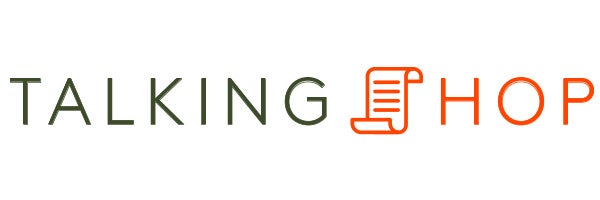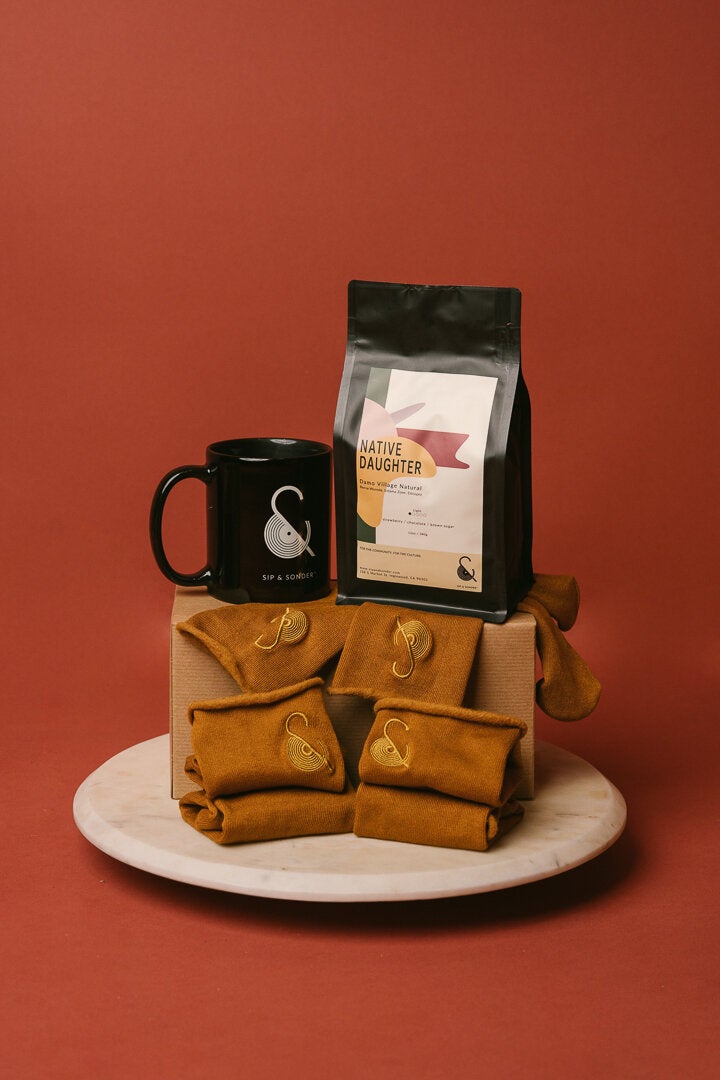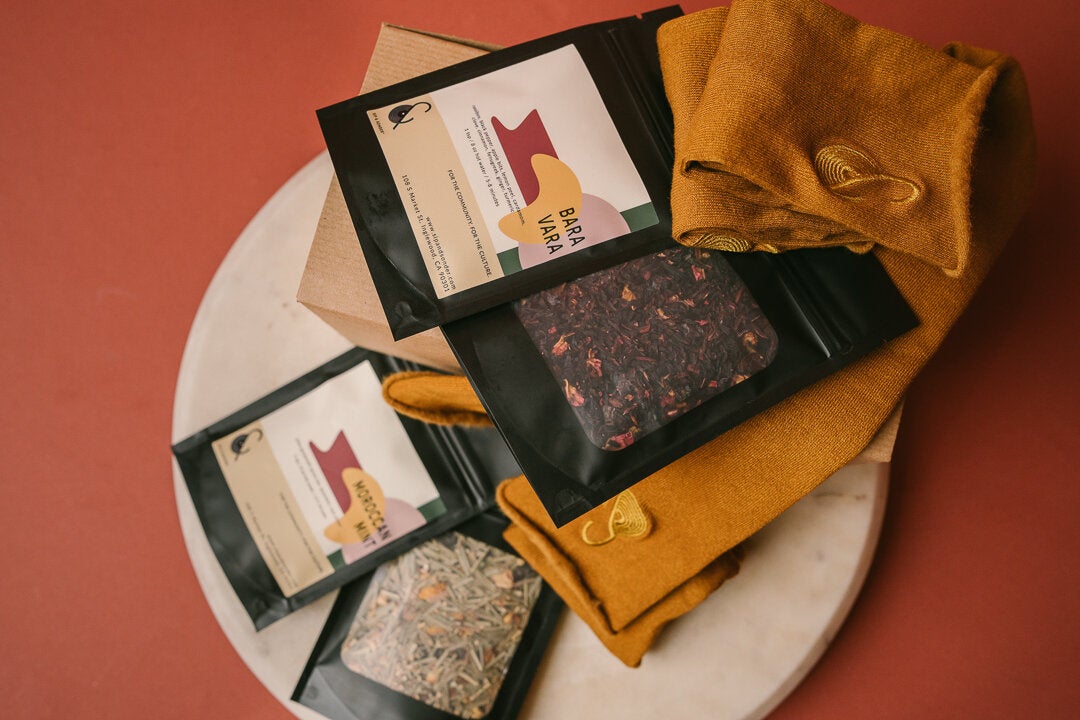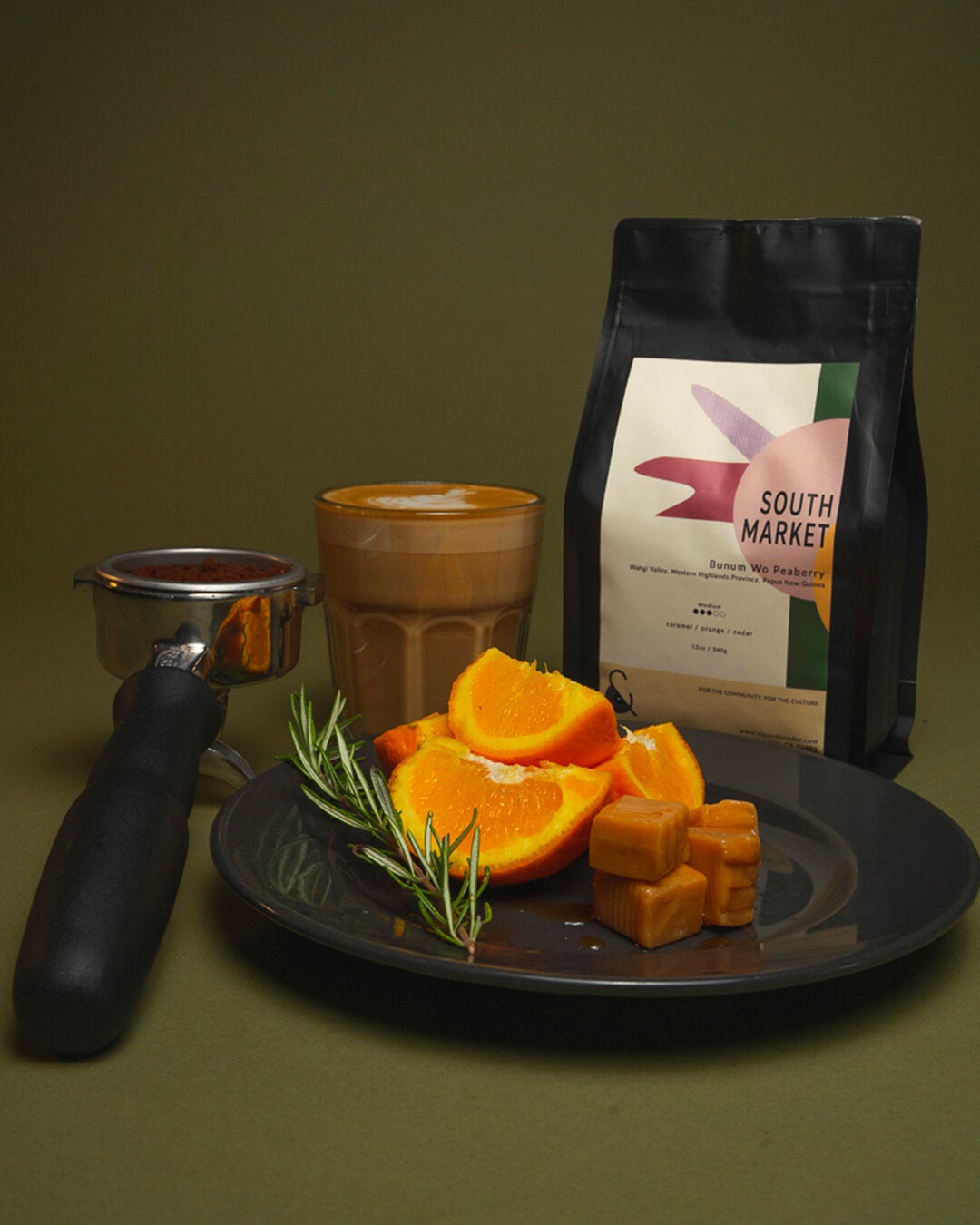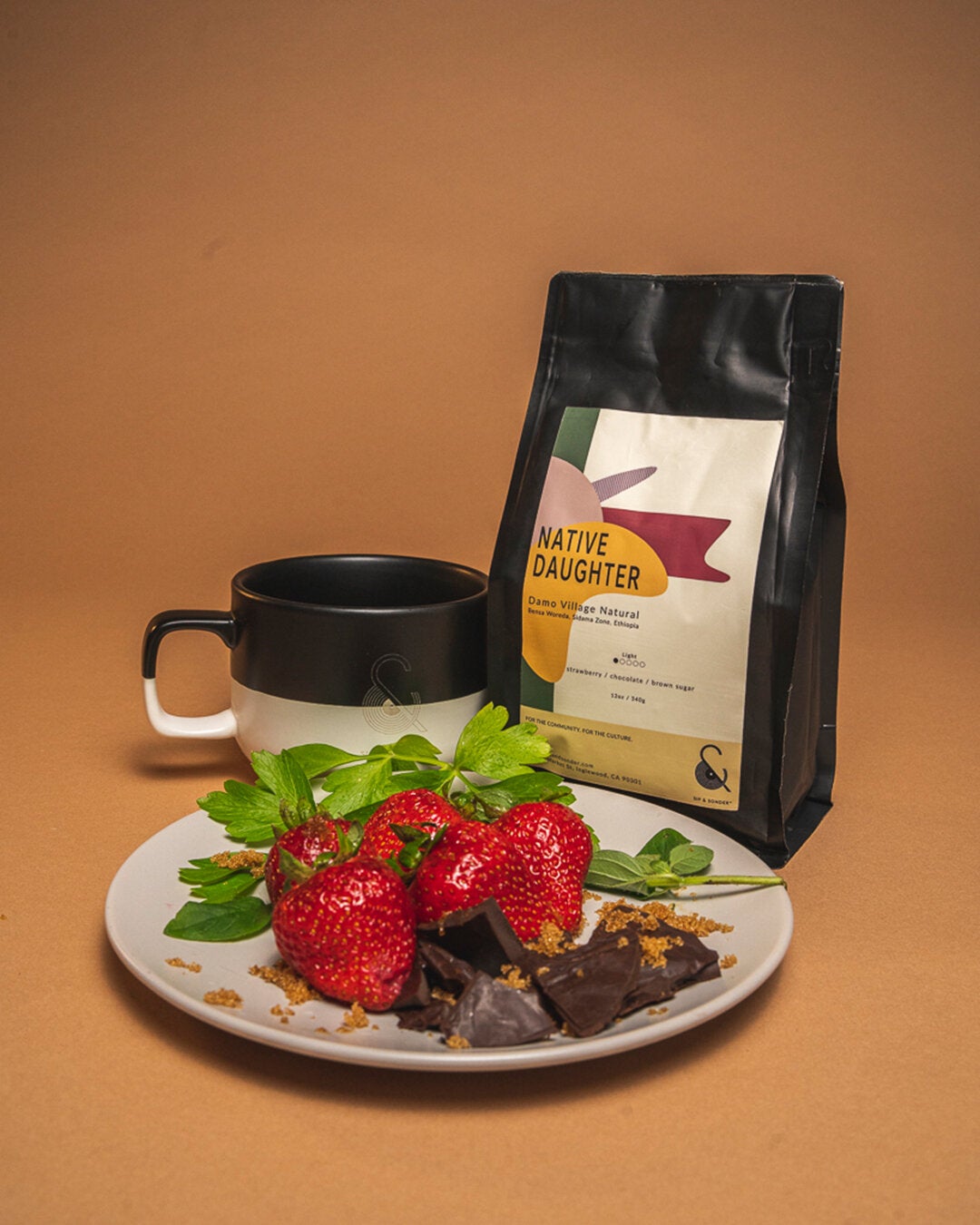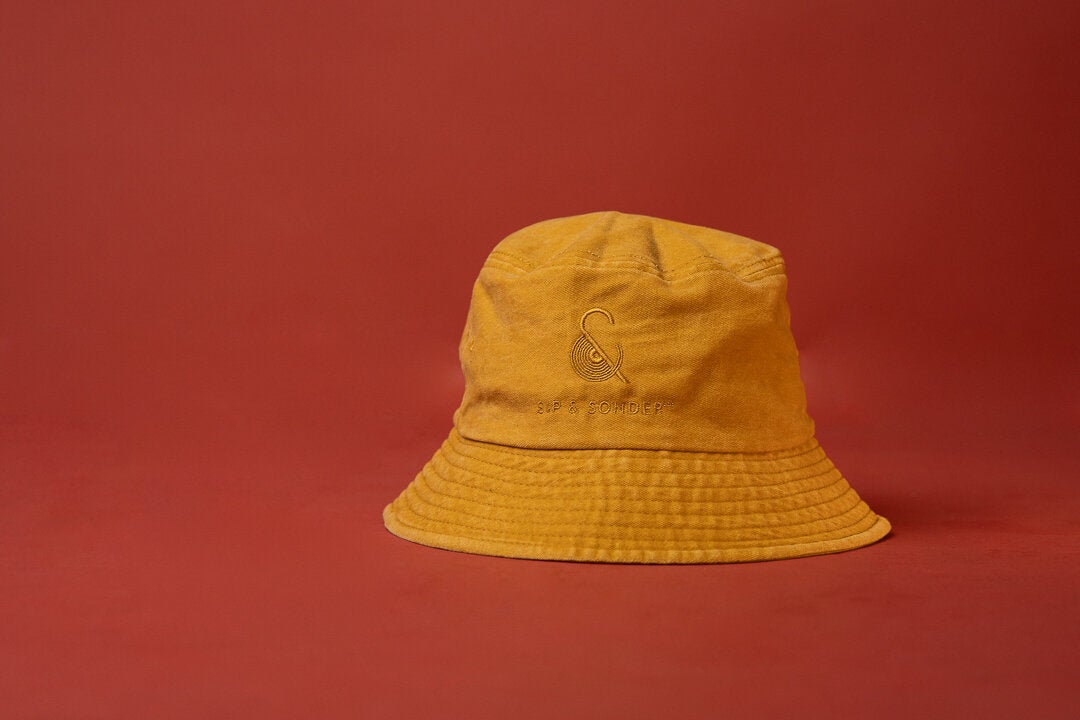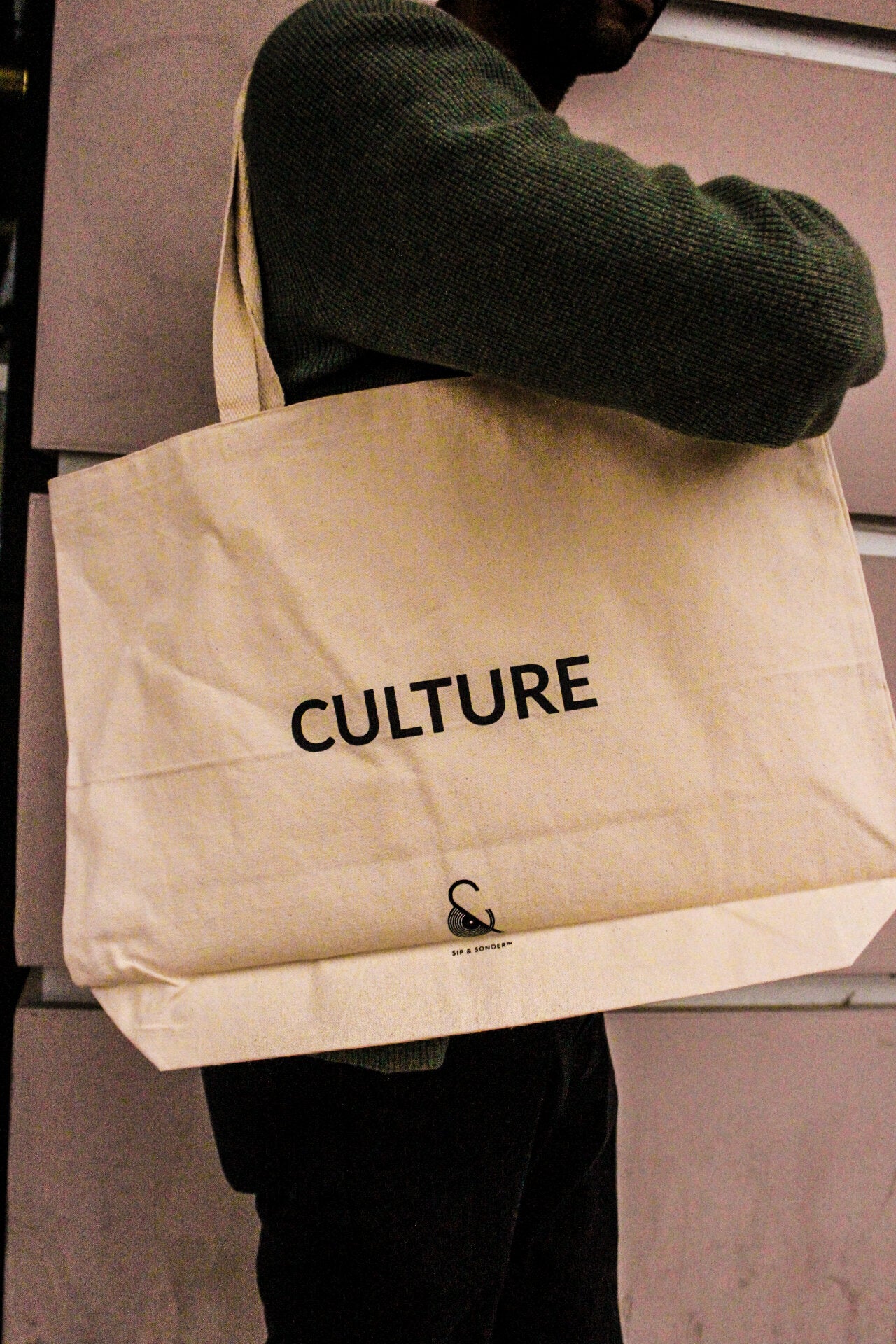Why Two Corporate Attorneys Moved Across The Country To Open A Coffee Shop
Courtesy of Sip & Sonder
"Coffee is a connector," Amanda-Jane Thomas, co-founder of Sip & Sonder tells Refinery29. "No matter where you are in the world, people say, 'let's grab a cup of coffee,' and that means we're going to sit, have some time together, and connect in some way."
At first, Sip & Sonder might simply seem like just another coffee house, but what Thomas and her friend and business partner Shanita Nicholas have created in Inglewood, California is actually so much more. "We have so much going on, and coffee is an amazing conduit for all of it," Thomas explains.
AdvertisementADVERTISEMENT
Yes, there's a coffee roaster inside Sip & Sonder's flagship location and baristas who serve "traceable and sustainable" coffees, teas, and pastries to shop regulars. But, there's also a production studio and event space with regular programming that encourages community engagement. Even in a COVID-19 world, Sip & Sonder has found ways to bring people together. When we spoke to Thomas and Nicholas in October, their space was about to be used as a flex voting center ahead of the election, perfectly reflecting Sip & Sonder's slogan: "For the Community, For the Culture."
In this edition of Talking Shop, Thomas and Nicholas tell us all about how they went from working together as attorneys at a big New York City law firm to opening a coffee shop on the other side of the country. The co-founders also share how important it is for entrepreneurs to identify what their businesses stand for, and reveal an unexpected moment that made it clear all the hard work they put into opening Sip & Sonder had been worth it.
Courtesy of Sip & Sonder
Refinery29: Walk me through the process of launching Sip & Sonder
Amanda-Jane Thomas: It's funny how Sip & Sonder came into existence. We are both practicing attorneys, and we met working at our first law firm in New York. When you're working as an attorney at a big Wall Street law firm, it's pretty busy — you're working around the clock, burning the midnight oil. I was passionate about the law but knew that there was something else. I think that's something we all can relate to no matter what our age is, but especially in our twenties, where you're doing something, but you're always wondering: Is this it? Shanita felt that as well. Just meeting as two coworkers and learning that about one another allowed us to have the time to develop and communicate with each other about what our passions were outside of the law. We gave each other the time and patience to figure that out.
Right up until Sip & Sonder, I personally was feeling like, This can't be it. I'm working around the clock, I don't see my family and friends, I live and eat dinner and breakfast at the firm. This isn't it. I think that desperation and that patience of communication, long story short, led to us realizing we had these passions outside of the law that were actually so well-aligned. Shanita has a deep passion for coffee, which is the crux of our business, and I'm into space and production, so that's how Sip & Sonder was born.
Shanita Nicholas: In the beginning, because we had those passions that were so aligned, we were able to put pen to paper and start drafting through a business plan and looking at everything from location and our market to our competitors in the area. We chose Inglewood because we did a lot of work within that space through our nonprofit, LA Black Investors Club, so we already had the connection to the community. We wanted to see how we could be more involved here and work with the community to build something more.
AJT: Because there are so many moving parts when you're starting a business, you have to identify all of them and then come up with a plan of attack for each. There are those more logistical, operational aspects, and then there's "what do we stand for?" That's something that can be easy to lose sight of, but it's also something that requires a lot of attention if you're trying to build an actual brand. If you're a consumer-facing brand, consumer confidence in who you are is everything; consumers have great memories. We are consumers, so we know all the ways we think about the brands we love and the brands we don't. We had to think about what it is about those brands we love and the reasons that we love them and then think about how that connects to the business that we have. That's something that's separate from the financing, construction, and hands-on operations. It's that broader, ephemeral, intangible, existential stuff that's also super important and ever-evolving.
When we embarked on the process and got our space in 2017, we were like, "Okay, in five months, by the end of the year, we'll be able to open." Then as each of those targets crept up, we were like, "Okay, we'll push it three months. We'll push it five months." Now, in retrospect, it's so funny that we really thought we were going to open the space in three months, but it's that idea of not really having fully appreciated all the things it takes as well as all of the delays that are inevitable with certain timelines.
Amanda-Jane Thomas: It's funny how Sip & Sonder came into existence. We are both practicing attorneys, and we met working at our first law firm in New York. When you're working as an attorney at a big Wall Street law firm, it's pretty busy — you're working around the clock, burning the midnight oil. I was passionate about the law but knew that there was something else. I think that's something we all can relate to no matter what our age is, but especially in our twenties, where you're doing something, but you're always wondering: Is this it? Shanita felt that as well. Just meeting as two coworkers and learning that about one another allowed us to have the time to develop and communicate with each other about what our passions were outside of the law. We gave each other the time and patience to figure that out.
Right up until Sip & Sonder, I personally was feeling like, This can't be it. I'm working around the clock, I don't see my family and friends, I live and eat dinner and breakfast at the firm. This isn't it. I think that desperation and that patience of communication, long story short, led to us realizing we had these passions outside of the law that were actually so well-aligned. Shanita has a deep passion for coffee, which is the crux of our business, and I'm into space and production, so that's how Sip & Sonder was born.
Shanita Nicholas: In the beginning, because we had those passions that were so aligned, we were able to put pen to paper and start drafting through a business plan and looking at everything from location and our market to our competitors in the area. We chose Inglewood because we did a lot of work within that space through our nonprofit, LA Black Investors Club, so we already had the connection to the community. We wanted to see how we could be more involved here and work with the community to build something more.
AJT: Because there are so many moving parts when you're starting a business, you have to identify all of them and then come up with a plan of attack for each. There are those more logistical, operational aspects, and then there's "what do we stand for?" That's something that can be easy to lose sight of, but it's also something that requires a lot of attention if you're trying to build an actual brand. If you're a consumer-facing brand, consumer confidence in who you are is everything; consumers have great memories. We are consumers, so we know all the ways we think about the brands we love and the brands we don't. We had to think about what it is about those brands we love and the reasons that we love them and then think about how that connects to the business that we have. That's something that's separate from the financing, construction, and hands-on operations. It's that broader, ephemeral, intangible, existential stuff that's also super important and ever-evolving.
When we embarked on the process and got our space in 2017, we were like, "Okay, in five months, by the end of the year, we'll be able to open." Then as each of those targets crept up, we were like, "Okay, we'll push it three months. We'll push it five months." Now, in retrospect, it's so funny that we really thought we were going to open the space in three months, but it's that idea of not really having fully appreciated all the things it takes as well as all of the delays that are inevitable with certain timelines.
AdvertisementADVERTISEMENT
shop 6 products
Have you received any funding for Sip & Sonder? If so, what kind?
SN: We self-funded most of the space. We had an early-on filled-out loan from the Small Business Administration. That was a decision we made together. It was a tough decision, but I think in retrospect, it put us in a place now to look at options, which I think is really great… We learned construction because we were self-funded and didn't have the money to bring in a big general contractor, so we quarterbacked a lot of the buildout.
AJT: To be completely honest and transparent, that took a while. Capital is huge. That's that elephant in the room, when you see a business that's able to pop up from seemingly out of nowhere, there was some capital there. Wherever it came from, the sources may not be known, but there was capital. Not having that — as well as us both continuing to work full-time because we were self-funding — it all took a while. Taking on this project of becoming entrepreneurs and coming up with a business plan and handling all those ancillary needs like becoming a general contractor or getting deep into the design... I've never thought of myself as a designer — that's not my passion — but we became interior designers. We had to wear all those hats.
SN: We self-funded most of the space. We had an early-on filled-out loan from the Small Business Administration. That was a decision we made together. It was a tough decision, but I think in retrospect, it put us in a place now to look at options, which I think is really great… We learned construction because we were self-funded and didn't have the money to bring in a big general contractor, so we quarterbacked a lot of the buildout.
AJT: To be completely honest and transparent, that took a while. Capital is huge. That's that elephant in the room, when you see a business that's able to pop up from seemingly out of nowhere, there was some capital there. Wherever it came from, the sources may not be known, but there was capital. Not having that — as well as us both continuing to work full-time because we were self-funding — it all took a while. Taking on this project of becoming entrepreneurs and coming up with a business plan and handling all those ancillary needs like becoming a general contractor or getting deep into the design... I've never thought of myself as a designer — that's not my passion — but we became interior designers. We had to wear all those hats.
Did either of you attend business school? Are there skills from law school or practicing law that helped you in the process of launching and running Sip & Sonder?
SN: I did go to business school, but there's really nothing that prepares you to actually run a business. Beyond law, I also have a degree in engineering, and that came in handy because we were doing a lot of construction work. There was one time, we were talking with our landlord about plumbing issues. I walked through and explained the issues to him, and whether or not he understood, I don't know, but I said it well enough that he gave us the allowances. So it's those sorts of things, and of course, it's all-day law.
AJT: I think our backgrounds definitely were and are a huge asset to us being able to navigate it all. We are our own attorneys for the business and so much of starting and running a business is paperwork. Whether it's getting a space or financing, there are documents upon documents upon documents, and that happens to be something that we were already doing all day — reading through documents, negotiating, and making it all work. I think coming from our corporate backgrounds enabled us to be able to wear all of those different hats. Corporate law is about servicing the business world. While we didn't have tangible experience with plumbing or with electrical, in terms of the things needed to push us forward, it helped that we had negotiated on behalf of clients a million times. We were now doing it for ourselves.
SN: It even helped with the waiting. I've called the IRS a thousand times throughout my career and just waited until they answered, so I knew what to expect when waiting for responses from government entities. I think having that awareness was really beneficial and a little less frustrating — there were still frustrating moments but a bit less frustrating — because we knew that sometimes the red tape is there.
SN: I did go to business school, but there's really nothing that prepares you to actually run a business. Beyond law, I also have a degree in engineering, and that came in handy because we were doing a lot of construction work. There was one time, we were talking with our landlord about plumbing issues. I walked through and explained the issues to him, and whether or not he understood, I don't know, but I said it well enough that he gave us the allowances. So it's those sorts of things, and of course, it's all-day law.
AJT: I think our backgrounds definitely were and are a huge asset to us being able to navigate it all. We are our own attorneys for the business and so much of starting and running a business is paperwork. Whether it's getting a space or financing, there are documents upon documents upon documents, and that happens to be something that we were already doing all day — reading through documents, negotiating, and making it all work. I think coming from our corporate backgrounds enabled us to be able to wear all of those different hats. Corporate law is about servicing the business world. While we didn't have tangible experience with plumbing or with electrical, in terms of the things needed to push us forward, it helped that we had negotiated on behalf of clients a million times. We were now doing it for ourselves.
SN: It even helped with the waiting. I've called the IRS a thousand times throughout my career and just waited until they answered, so I knew what to expect when waiting for responses from government entities. I think having that awareness was really beneficial and a little less frustrating — there were still frustrating moments but a bit less frustrating — because we knew that sometimes the red tape is there.
AdvertisementADVERTISEMENT
You mentioned that you're both still practicing. How do you balance your law career with your entrepreneurial pursuits?
AJT: I'll tell you about pre-2020 because 2020 is its own situation. But, pre-COVID, I honestly don't know. There are never enough hours in the day, and to be completely honest, once Sip & Sonder and our other endeavors entered the picture, there was a feeling like there were balls being dropped. We practice on our own now, but we were employed by law firms. We were really proud of that, took it very seriously, and wanted to be high-performing. We wanted to continue to be top-tier attorneys, but there was obviously a pull on our time. When people ask "how did you do that?" it was a lot of those early mornings, late nights, and working around the clock, which inevitably has a burnout. I think we both experienced that because we needed rest and didn't have time for ourselves.
I think that's something that entrepreneurs need to realize more. It's so easy to pour yourself into your business because if you don't do it, who will? But you are not your business. You are a person that needs to care for yourself. So, in terms of professional balance, it's really hard to find. For most of my years of practice while building Sip & Sonder, it really was just making it work. I know that that might not be a satisfying answer, but it was a lot.
AJT: I'll tell you about pre-2020 because 2020 is its own situation. But, pre-COVID, I honestly don't know. There are never enough hours in the day, and to be completely honest, once Sip & Sonder and our other endeavors entered the picture, there was a feeling like there were balls being dropped. We practice on our own now, but we were employed by law firms. We were really proud of that, took it very seriously, and wanted to be high-performing. We wanted to continue to be top-tier attorneys, but there was obviously a pull on our time. When people ask "how did you do that?" it was a lot of those early mornings, late nights, and working around the clock, which inevitably has a burnout. I think we both experienced that because we needed rest and didn't have time for ourselves.
I think that's something that entrepreneurs need to realize more. It's so easy to pour yourself into your business because if you don't do it, who will? But you are not your business. You are a person that needs to care for yourself. So, in terms of professional balance, it's really hard to find. For most of my years of practice while building Sip & Sonder, it really was just making it work. I know that that might not be a satisfying answer, but it was a lot.
SN: This question makes me think of this one time we had a city permitting meeting. It was one of those things that took months to get, and if we couldn't make it, it was going to be an issue. I think Amanda was still in New York at this time, and I had a deal closing. For some reason, they didn't have chairs at City Hall, so I was sitting on the floor waiting for the number to be called, typing furiously and hoping that the partners didn't realize that I was doing this other thing while trying to close the deal. It's those moments of trying to bounce between the two because we hold ourselves to a standard of if we say we're going to do something, we want to do it well.
Now, it's all about prioritizing and restructuring. We're going to do what we're doing well and take care of ourselves. We have a lot of open communication between the two of us, and that's one thing I really appreciate about our partnership. I can tell Amanda, "For the next two days, I need to go out to the woods." We have carved out time for one another and even force each other to carve out time for ourselves. I think that's so important. It's something I didn't know that I was going to need, and I'm so glad that I have it.
Now, it's all about prioritizing and restructuring. We're going to do what we're doing well and take care of ourselves. We have a lot of open communication between the two of us, and that's one thing I really appreciate about our partnership. I can tell Amanda, "For the next two days, I need to go out to the woods." We have carved out time for one another and even force each other to carve out time for ourselves. I think that's so important. It's something I didn't know that I was going to need, and I'm so glad that I have it.
AdvertisementADVERTISEMENT
Courtesy of Sip & Sonder
Speaking of getting support from others, how many employees do you have at Sip & Sonder?
AJT: Before COVID, we had a team of 10. We make sure everyone's trained to be a barista even if they're at the front. Sip & Sonder needed to be able to run itself. To be successful as a business, the founders shouldn't have to be in the building. Behind the scenes, we were obviously still working because we were still a small business in early stages, but on the ground, open seven days a week from morning to night, we had a team here that was amazing and really represented the brand.
Once COVID hit, we did close temporarily. We had to furlough our team and some team members moved back home. Now, we're back open with limited hours for storefront pickup only. We have done some new hiring, and our team is now eight. They're amazing individuals both in what they do here at Sip & Sonder and in just being so dynamic in their interests. We actually look for that when we're hiring. I think that with a lot of corporate jobs, based on our extensive experience in corporate America, it's almost like you're supposed to pretend like you don't have other passions and you need to eat, sleep, and breathe what your job is. Certainly, you should take your job seriously, you should want to perform at a high level, and you should want to represent your company well, but we're also all dynamic people. We have other passions and interests and actually being able to be honest about that makes for a more dynamic workplace. That's something we've encouraged at Sip & Sonder by hiring people who are unique and allowing them to bring different interests and skills to the table.
SN: Because we really spent so much time getting the ethos of our company and the culture of our company just right, even before the interview process, people come to us because they want to be engaged in a brand that has our mission. So I think we're lucky to have a team that is so amazing, but we have also worked hard to create and outwardly project what we are trying to do with Sip & Sonder and that has attracted individuals from the community that are aligned with that. Looking back to those early days, I really appreciate the time and effort we put into making sure our brand is clear and how we view our relationship with the community is clear because that influences how our team is going to do and behave within the space as well.
AJT: Before COVID, we had a team of 10. We make sure everyone's trained to be a barista even if they're at the front. Sip & Sonder needed to be able to run itself. To be successful as a business, the founders shouldn't have to be in the building. Behind the scenes, we were obviously still working because we were still a small business in early stages, but on the ground, open seven days a week from morning to night, we had a team here that was amazing and really represented the brand.
Once COVID hit, we did close temporarily. We had to furlough our team and some team members moved back home. Now, we're back open with limited hours for storefront pickup only. We have done some new hiring, and our team is now eight. They're amazing individuals both in what they do here at Sip & Sonder and in just being so dynamic in their interests. We actually look for that when we're hiring. I think that with a lot of corporate jobs, based on our extensive experience in corporate America, it's almost like you're supposed to pretend like you don't have other passions and you need to eat, sleep, and breathe what your job is. Certainly, you should take your job seriously, you should want to perform at a high level, and you should want to represent your company well, but we're also all dynamic people. We have other passions and interests and actually being able to be honest about that makes for a more dynamic workplace. That's something we've encouraged at Sip & Sonder by hiring people who are unique and allowing them to bring different interests and skills to the table.
SN: Because we really spent so much time getting the ethos of our company and the culture of our company just right, even before the interview process, people come to us because they want to be engaged in a brand that has our mission. So I think we're lucky to have a team that is so amazing, but we have also worked hard to create and outwardly project what we are trying to do with Sip & Sonder and that has attracted individuals from the community that are aligned with that. Looking back to those early days, I really appreciate the time and effort we put into making sure our brand is clear and how we view our relationship with the community is clear because that influences how our team is going to do and behave within the space as well.
AdvertisementADVERTISEMENT
What has been your biggest business challenge so far in running Sip & Sonder?
SN: I think one of the most recent ones, which has been hugely impactful, was the initial decision to close the space at the top of COVID. It was at a time when we could have remained open maybe for another month or so, but we knew if we didn't do what we did, our ability to sustain for the long run was going to be put at risk. We needed that time to gameplan without physical operations. Looking back, it was the best decision, but in the moment, it was pretty difficult. That night was a sobering one.
AJT: I definitely agree. To add another, more broad one, the challenge of financing has been huge. As entrepreneurs, you have a vision, and as I said earlier, making that big vision happen takes capital. Because the creation of who we are as a brand was so important to us, we wanted to remain hands-on and retain control as we built the business, which meant we were bootstrapping. That difficult decision is certainly not something that's unique to Sip & Sonder and our story. It's a challenge. It's by no means an insurmountable one, but it's a huge consideration. The challenge of financing is also an ongoing one — you want your business to grow — and it's one that's only been made more complicated by COVID.
SN: I think one of the most recent ones, which has been hugely impactful, was the initial decision to close the space at the top of COVID. It was at a time when we could have remained open maybe for another month or so, but we knew if we didn't do what we did, our ability to sustain for the long run was going to be put at risk. We needed that time to gameplan without physical operations. Looking back, it was the best decision, but in the moment, it was pretty difficult. That night was a sobering one.
AJT: I definitely agree. To add another, more broad one, the challenge of financing has been huge. As entrepreneurs, you have a vision, and as I said earlier, making that big vision happen takes capital. Because the creation of who we are as a brand was so important to us, we wanted to remain hands-on and retain control as we built the business, which meant we were bootstrapping. That difficult decision is certainly not something that's unique to Sip & Sonder and our story. It's a challenge. It's by no means an insurmountable one, but it's a huge consideration. The challenge of financing is also an ongoing one — you want your business to grow — and it's one that's only been made more complicated by COVID.
What about your biggest business win?
AJT: The first thing that comes to mind is something we heard from two different families in the community. We have our regulars and families that come in and we chat, and on two occasions, parents have told us that their children were playing make-believe, and they both were pretending that they had a coffeehouse called Sip & Sonder. That is like the biggest win because it's exactly why we're doing what we're doing. That that can be a narrative these young kids — three-, five-, and seven-year-olds — have is everything. It's that moment where all of the pitfalls are worth it. I think the universe gives us those moments so we can be like, Okay, we can just keep doing what we're doing.
SN: That was particularly special because, for myself and Amanda, it's a reflection of what we saw growing up and the representation that we had. And, of course, we know how important representation is. To say you have a coffee shop is to say that you own a business and you're an entrepreneur, and to have that connection at that age, it's just really special.
AJT: The first thing that comes to mind is something we heard from two different families in the community. We have our regulars and families that come in and we chat, and on two occasions, parents have told us that their children were playing make-believe, and they both were pretending that they had a coffeehouse called Sip & Sonder. That is like the biggest win because it's exactly why we're doing what we're doing. That that can be a narrative these young kids — three-, five-, and seven-year-olds — have is everything. It's that moment where all of the pitfalls are worth it. I think the universe gives us those moments so we can be like, Okay, we can just keep doing what we're doing.
SN: That was particularly special because, for myself and Amanda, it's a reflection of what we saw growing up and the representation that we had. And, of course, we know how important representation is. To say you have a coffee shop is to say that you own a business and you're an entrepreneur, and to have that connection at that age, it's just really special.
AdvertisementADVERTISEMENT
What is your ultimate goal with Sip & Sonder?
SN: We're focusing on really building out our coffee brand, so we have our roaster in house, we started doing e-commerce over the summer — that was always part of the plan, but quarantine really sped up that process — and we're growing into connecting across the diaspora to source coffee, which goes back to the sustainable, traceable ethos of the coffee brand. So we're continuing to build out production there and really be a brand in that way, offering a consumable product that people connect to, understand the story behind, and are able to go around the world with. It's really exciting for us to grow that.
AJT: That's a tangible way to see how people are experiencing Sip & Sonder wherever they are in the world, whether they're at home, at the office, in a hotel, or at a museum. What we've created here is the flagship physical location with creative studio space, but through growing our operations, building out wholesale accounts, and getting into different retail, we're now growing the lifestyle part of the brand with coffee being experienced and consumed widely.
We're actually getting ready to launch a holiday line that's called "Be You With Us," and it's about the ways that you can be truly authentic and be who you are while with us. That goes to what Sonder is — it's the realization that everyone is living their own lives. It's crazy, hectic, beautiful, there are ups and downs, but there's still a point of empathy and connection. So you can be yourself but still be tapped into this experience that you're sharing with others through our coffee, products, programs, and content.
SN: We're focusing on really building out our coffee brand, so we have our roaster in house, we started doing e-commerce over the summer — that was always part of the plan, but quarantine really sped up that process — and we're growing into connecting across the diaspora to source coffee, which goes back to the sustainable, traceable ethos of the coffee brand. So we're continuing to build out production there and really be a brand in that way, offering a consumable product that people connect to, understand the story behind, and are able to go around the world with. It's really exciting for us to grow that.
AJT: That's a tangible way to see how people are experiencing Sip & Sonder wherever they are in the world, whether they're at home, at the office, in a hotel, or at a museum. What we've created here is the flagship physical location with creative studio space, but through growing our operations, building out wholesale accounts, and getting into different retail, we're now growing the lifestyle part of the brand with coffee being experienced and consumed widely.
We're actually getting ready to launch a holiday line that's called "Be You With Us," and it's about the ways that you can be truly authentic and be who you are while with us. That goes to what Sonder is — it's the realization that everyone is living their own lives. It's crazy, hectic, beautiful, there are ups and downs, but there's still a point of empathy and connection. So you can be yourself but still be tapped into this experience that you're sharing with others through our coffee, products, programs, and content.
This interview was edited for length and clarity.
In Refinery29's new Talking Shop series, we're chatting with owners of up-and-coming small businesses about their experiences launching, the big challenges and wins they've faced, and of course, their products and services. Discover new spots to patronize, while getting an intimate look at what it takes to run a small business in today's economy. Do you run a small business or do you want to recommend a small business you'd like to see featured on Talking Shop? Tell us more about it here.
AdvertisementADVERTISEMENT







